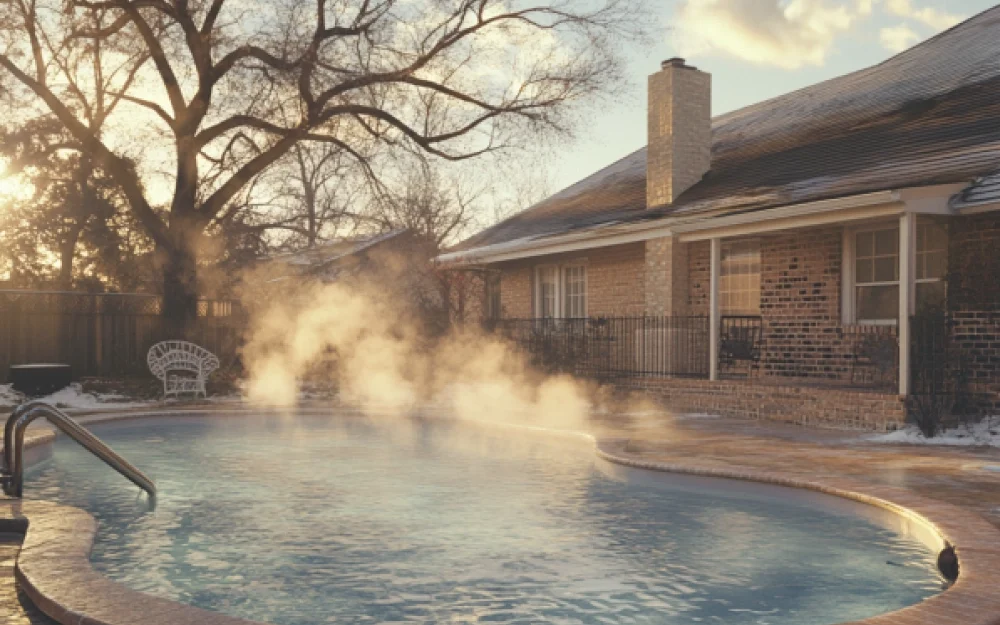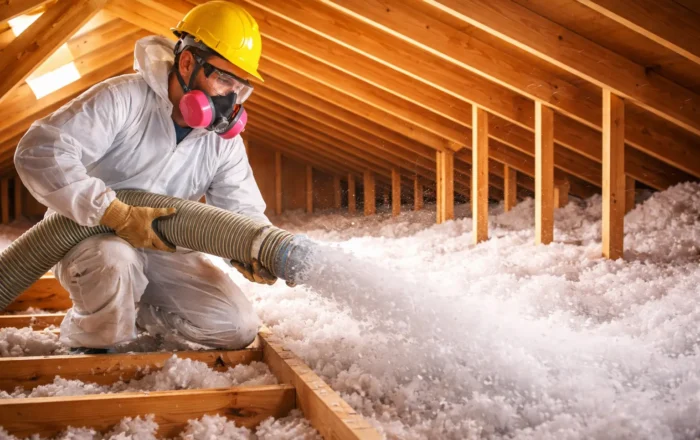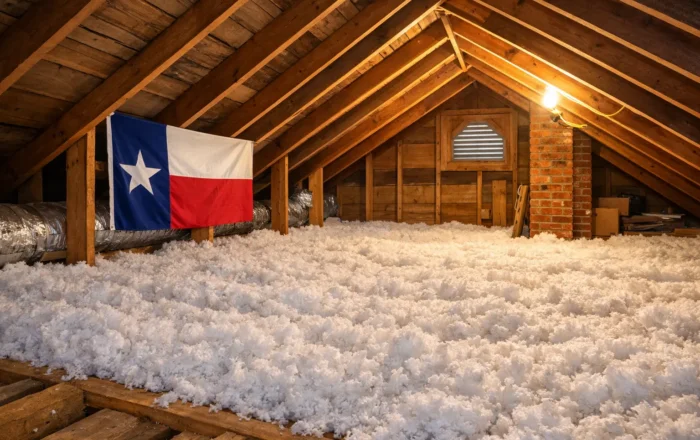How to Insulate Your Attic
5 minute readHow to insulate an attic, what it costs, and how it reduces your electric bill
Home > BKV Energy Blog > All Posts > How Much Does It Cost to Heat a Pool?
5 minute read • Last update July 2025

Did you know that over 800,000 Texan homes have a swimming pool? If you’re one of them, you already know that pool heater installation can extend the swimming season, keeping the water at a comfortable temperature year-round.
But how much does it cost to heat a pool? For many homeowners, balancing comfort and cost is key. In this guide, we’ll break down everything you need to know about heating pools, including:
The cost of heating a pool can vary significantly depending on your heater’s fuel source. Plus, monthly pool heater costs may not always be stable. For example, calculating a precise electric pool heater cost per month can be tricky in areas with unpredictable or rapidly changing weather patterns. Similarly, using a gas or propane heater can result in significant cost swings when the price of fuel increases or supply becomes limited.
But how much does it cost to heat a pool on average? Here is a table to help you estimate your monthly pool heater cost based on the type of heating system you choose.
| Type of Pool Heater | Average Monthly Cost of a Pool Heater | Details |
| Electric heaters | $100 – $250 | An electric heater is generally affordable but consumes more power, especially when maintaining higher temperatures. |
| Natural gas heaters | $150 – $350 | Natural gas is particularly efficient for heating a large pool quickly though monthly costs fluctuate based on usage. |
| Propane heaters | $200 – $450 | Using a standalone propane tank typically leads to higher operating costs but provides effective heating, especially for smaller pools. |
| Solar heater | $20 – $60 | Solar pool heaters have minimal additional costs after installation but rely on sunny weather for consistent performance. |
| Heat pumps | $75 – $200 | Electric heat pumps offer a cost-effective solution with relatively low operating costs, especially in moderate climates. |
Aside from the fuel source, the cost to heat pool water may also be influenced by several other factors. Here’s a list of key considerations:
Understanding these factors can help you decide on the best heating solution based on your current budget and long-term needs.
The purchase price and cost to install a pool heater vary considerably depending on the type of system you choose. Here’s a quick breakdown of price estimates, new pool heater installation costs, and the primary pros and cons for each option.
Electric pool heaters typically cost between $1,500 and $3,500. The installation process involves connecting the heater to your inground pool’s filtration system and electrical supply, which usually costs $500 to $1,500 in electrician fees.
Natural gas heaters usually cost between $1,500 and $4,000. Installing one in your backyard pool requires a professional plumber or gas technician to ensure connections are safe and meet local building codes. You should expect to pay $800 to $2,000 for installation.
Propane heaters can cost anything from $2,000 to $4,500. The tank can be a large, permanent installation or a smaller, standalone setup. Either way, professional installation is required to ensure proper operation and safety. This generally costs $1,000 to $2,500.
Solar systems typically cost between $2,000 to $5,000. Installation ranges from $1,000 to $3,000 and can be complex, requiring permits and professional expertise to ensure optimal positioning and system integration.
Heat pumps typically cost $2,000 to $4,500 to purchase. Because they are connected to your filtration system, an electrical connection is required, and the unit must be placed in an area that allows for optimal air circulation. Electric heat pump installation is relatively simple and usually costs $500 to $2,500.
Whichever type of inground pool heaters you decide on, there are several ways you can save money on your energy bills when swim season comes around. Here’s a list of actionable tips that could lead to significant savings.
By applying these simple yet effective tips, you can properly heat your pool while keeping costs down, ensuring you can enjoy all your home’s lifestyle spaces without breaking the bank.
By understanding the costs associated with heating and applying the right energy-saving tips, you can make full use of your pool year-round. But that’s not the only way to ensure worry-free pool use. Choosing the right energy plan is also essential.
At BKVE, we offer a range of tailored options based on your household’s usage patterns. So, you can go ahead and plan your next pool party with confidence—without worrying about your energy bill.
Ready to save? Check out our gimmick-free electricity plans and see how much you could save. Our tried-and-tested Bluebonnet plan helps many Texans save up to $800 annually!
Graham Lumley, Digital Marketing Manager at BKV Energy, leads digital and traditional marketing strategies, focusing on educating Texans about the state's deregulated energy market. With over 8 years of marketing experience, he creates content to help consumers understand and save on their energy bills, bringing a fresh and dynamic approach to the industry.

How to insulate an attic, what it costs, and how it reduces your electric bill

Energy Saving Tips Home Improvement
Reduce heat loss, improve comfort, and lower winter electricity costs
Get $50 off your electric bill!
Use code BKVEJOINUS50
Enter your zip code to shop BKV Energy's affordable, fixed-rate Texas electricity plans. Use the promo code for $50 off your electric bill.